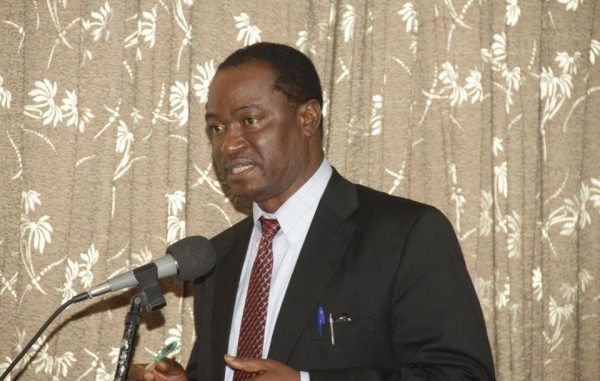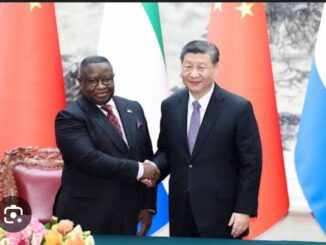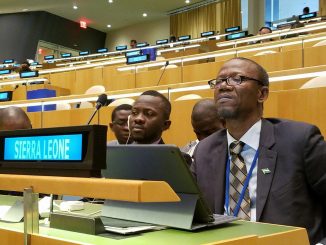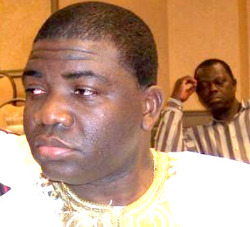
STATEMENT BY THE MINISTER OF FOREIGN AFFAIRS AND INTERNATIONAL COOPERATION, Dr SAMURA M W KAMARA, TO PARLIAMENT FOR THE RATIFICATION OF FIVE CONVENTIONS/PROTOCOLS AND THE CHARTER OF THE ORGANISATION OF ISLAMIC COOPORATION (OIC)
Mr. Speaker, Honourable Members,
On Thursday 6 October, 2016 my Ministry laid before this honourabe House, five United Nations Conventions on the Environment and the Charter of the Organisation of Islamic Cooperation (OIC) in an effort to meet some of our international treaty obligations under the Charters of the United Nations and the Organisation of Islamic Cooperation. The six items before the house for consideration are:
- The Paris Agreement on Climate Change;
- The Minamata Convention;
- The Rotterdam Convention;
- The Basel Convention;
- The Nagoya Protocol and
- The OIC Charter
Mr. Speaker, Honourable Members,
I will now endeavour to provide a brief description of the purpose of each of the international instruments being proposed for ratification:
- The Paris Agreement on Climate Change
The Paris Agreement is within the context of the United Nations Framework Convention on Climate Change (UNFCCC) dealing with greenhouse gases emissions mitigation, adaptation and finance, beginning in the year 2020. The Paris Agreement is the outcome of negotiations adopted by 192 countries during the 21st Conference of the Parties of the UNFCC on 12th December, 2015, in Paris, France. It was subsequently opened for signature by the Secretary General of the United Nations on 22nd April, 2016 (Earth day) at the UN Headquarters, A recorded number of 175 countries signed during the ceremony. The Signature Ceremony was another important step in further securing the world’s collective commitment to tackling climate change, facilitate the early entry into force of the Paris Agreement, and provides for the smooth finalization of the operational details needed to give effect to its provisions. As a party to the Convention, Sierra Leone fully participated during the adoption of the Agreement in Paris and at the signature ceremony in New York. I am honoured to inform this noble House that His Excellency the President Dr. Ernest Bai Koroma, signed the Paris Agreement on the margins of the 71st UN General Assembly on 22nd September, 2016.
The Agreement aims to strengthen the global response to the threat of climate change, in the context of sustainable development and efforts to eradicate poverty, including by:
- Holding the increase in the global average temperature to well below 2 °C above pre-industrial levels and pursuing efforts to limit the temperature increase to 5 °C above pre-industrial levels, recognizing that this would significantly reduce the risks and impact of climate change;
- Increasing the ability to adapt to the adverse impacts of climate change and foster climate resilience and low greenhouse gas emissions development, in a manner that does not threaten food production; and
- Making finance flows consistent with a pathway towards low greenhouse gas emissions and climate-resilient development.
The Agreement will be implemented to reflect equity and the principle of common but differentiated responsibilities and respective capabilities, in the light of different national circumstances.
As Honourable Members are aware, the 5th Assessment report of the Intergovernmental Panel on Climate Change, ranks Sierra Leone as the third most vulnerable country, after Bangladesh and Guinea Bissau, to adverse effects of climate change. Also, very recently, the Climate Vulnerability Index 2015, ranks Sierra Leone as the second most vulnerable country.
Furthermore, Sierra Leone has low capacity to adapt to climate change. The rural population will be the most affected because of the high dependence on rain-fed agriculture and natural resource-based livelihoods. According to the science of climate change, these impacts are likely to continue to affect Sierra Leone in the future, despite the country being one of the least responsible countries for generating the problem, in terms of its contribution to global emissions of greenhouse gases, which is negligible.
These challenges have been associated with serious food security issues, health and environmental implications for our citizenry and the world at large, which therefore demands an immediate intervention by Governments and the international community.
Honourable Members, our Agenda for Prosperity commits Sierra Leone to mainstreaming inclusive green growth in ourr development process. Thus, by ratifying and domesticating the Paris Agreement, Sierra Leone will:
- create a new era for a harmonious relationship between the economy, the environment, social and long term sustainability;
- provide a pathway for partnership to shift to a green economy as well as for identification and implementation of various preventive, mitigation and adaptation measures.
- support the transition to low-emission development involving decoupling carbon emissions from economic growth through a series of measures across all economic sectors.
- provide the required platform for our country to contribute to the international strive towards achieving the Sustainable Development Goals.
The Paris Agreement and our accompanying National Action Plan, which has already been approved by Cabinet, will prepare the Government and people of Sierra Leone to limit our carbon footprint; minimize risks by improving adaptive capacity, reducing vulnerability to climate change impacts and increasing the resilience and sustainable wellbeing of all citizens; and to leverage new opportunities and facilitate collaboration in-country and with regional and global communities.
It is worth noting that the Paris Agreement will enter into force only after 55 countries that produce at least 55% of the world’s greenhouse gas emissions ratify, accept, approve or accede to the agreement. On 1 April 2016, the United States and China, who jointly represent almost 40% of global emissions, issued a joint statement, confirming that both countries will sign and ratify the Paris Climate Agreement. This development is critical to an early entry into force of the Agreement, and gives hope to countries that are most vulnerable to climate change. More than 15 countries, mostly Small Island Developing Countries (SIDs) have deposited their instruments of ratification at the time of signing.
Therefore, as one of the most vulnerable countries to the effect of climate change, it is well advised that Sierra Leone takes necessary steps to ratify the Paris Agreement sooner rather than later. We must not allow ourselves to be left behind.
Adherence to the implementation of the Paris Agreement will assist in enhancing Sierra Leone’s resilience to Climate Change impacts, a safer environment, strong institutions, increased productive capacity across all sectors, thereby, leading to green economic growth and sustainable development.
It will also reduce the burden on the socially disadvantaged and other vulnerable groups such as women and children through the implementation of programmes that will seek to address water scarcity, food insecurity maternal and child mortality.
In partnership with other stakeholders, including the Green Climate Fund (GCF), Global Environment Facility (GEF), United Nations Framework Convention on Climate Change and other international Climate Change funding windows, co funding support will of course be required of the Government of Sierra Leone.
COP 22, which will largely reflect on current national implementation strategies, plans and actions, is scheduled to be held in Morocco on November 15, this year.
- The Basel Convention
The Basel Convention on the Control of Trans-boundary Movements of Hazardous Wastes and Their Disposal usually known as the Basel Convention, is an international treaty designed to reduce the movements of hazardous waste between nations, and, specifically, to prevent transfer of hazardous waste from developed to less developed countries (LDCs). The Convention was adopted on 22nd March, 1989, and entered into force on 5 May, 1992.
It was created to address the increasing concerns over the management, disposal and trans-boundary movements of hazardous wastes. The Convention covers hazardous wastes that are explosive, flammable, poisonous, infectious, corrosive, toxic, or eco-toxic, with the potential of causing damage to human health and the environment.
The underlying principles of the Basel Convention are that:
- trans-boundary movements of hazardous wastes should be reduced to a minimum consistent with environmentally sound management;
- hazardous wastes should be treated and disposed of as close as possible to their source of generation; and
- hazardous waste generation should be reduced and minimized at source; and to assist LDC’s in environmentally sound management of the hazardous and other wastes they generate.
There are already 183 state parties to the convention and Sierra Leone happens to be among the very few UN member states (about 13) that are yet to ratify or acceded to the Convention.
- Rotterdam Convention
The Rotterdam Convention on the Prior Informed Consent Procedure for Certain Hazardous Chemicals and Pesticides in International Trade is a multilateral agreement that is meant to promote shared responsibilities and cooperative efforts in relation to importation of hazardous chemicals. It was adopted in Rotterdam on 10th September 1998 and entered into force on 24th February 2004.
The dramatic growth in chemicals production and trade during the past three decades has raised both public and official concern about the potential risks posed by hazardous chemicals and pesticides. Countries lacking adequate infrastructure to monitor the import and use of these chemicals are considered to be particularly vulnerable.
The convention promotes open exchange of information and calls on exporters of hazardous chemicals to use proper labelling, include directions on safe handling, and inform purchasers of any known restrictions or bans. Parties can, however, decide whether to allow or ban the importation of chemicals listed in the treaty, and exporting countries, too are also obliged to make sure that producers within their jurisdiction comply with the regulations.
- Minamata Convention on Mercury:
The Minamata Convention on Mercury is an international treaty designed to regulate the use of mercury through controlling anthropogenic emissions and releases of mercury and mercury compounds. The Convention was adopted on 19th January 2013 in the Japanese city of Minamata. It was named after this city because of the devastating incident of Mercury that the city and its people suffered which resulted in many deaths.
It is anticipated that over the next few decades, the Convention will enhance the reduction of mercury pollution from the targeted activities responsible for the major release of mercury to the immediate environment. By ratifying the convention, governments are able to protect the health of their citizens and the environment.
Sierra Leone participated in the negotiations that led to the adoption of the Convention in Minamata, Japan, and it was signed by our Permanent Representative to the United Nations in New York, on 12th August, 2014.
- The Nagoya Protocol
The Nagoya Protocol on Access and Benefit-Sharing is an international agreement which aims at sharing the benefits arising from the utilization of genetic resources in a fair and equitable way, as well as having appropriate access to genetic resources and by transfer of the relevant technologies, taking into account all rights over those resources and their technologies, and by appropriate funding, thereby contributing to the conservation of biological diversity and the sustainable use of its components.
It was adopted by the Conference of the Parties to the Convention on Biological Diversity at its tenth meeting on 29th October, 2010 in Nagoya, Japan and it entered into force on 12 October, 2014, ninety days after the date of deposit of the fiftieth instrument of ratification. The fair and equitable sharing of the benefits arising out of the utilization of genetic resources is one of the three objectives of the Convention on Biological Diversity.
- The Organisation of Islamic Cooperation (OIC)
The Organisation of Islamic Cooperation (OIC) founded in 1969, was primarily established to strengthen solidarity among member countries as well as the development of cooperation in political, economic, social, cultural and scientific spheres among its members. The Organisation is the collective voice of the Muslim world and seeks to safeguard and protect the interests of the Muslim world in the spirit of promoting international peace and harmony among various people of the world. The OIC is the second largest inter-governmental organisation after the United Nations and it has a membership of 57 states in various region of the world. The Organisation was established upon a decision of the historical summit which took place in Rabat, Kingdom of Morocco 25 September 1969 in response to the arson attack on the Al-Aqsa Mosque in occupied Jerusalem.
In order to protect the vital interests of its membership, as well as the promotion of peaceful settlement of conflicts and disputes involving Member States, the Organisation established a consultative and cooperative relationship with the UN and other inter-governmental organisations.
Mr. Speaker, Honourable Members,
Sierra Leone’s membership of the OIC dates back to 1972. Over the years Sierra Leone has received several Technical and Financial support from OIC Countries within the framework of organizational cooperation among Member States. During the fight against the Ebola scourge, Sierra Leone received a substantial logistic and financial assistance from OIC Member Countries, including Saudi Arabia, Turkey and Kuwait. This support was undoubtedly extended to Sierra Leone in the spirit of pursuing the objectives of the organization, whose core principles include the following:
- Enhance and consolidate the bonds of fraternity and solidarity among the Member States;
- Safeguard and protect the common interests and support the legitimate courses of the Member States and coordinate and unify the efforts of the Member States in view of the challenges faced by the Islamic world in particular, and the international community in general;
- Respect the right to self-determination and non-interference in the domestic affairs and respect sovereignty, independence and territorial integrity of each Member State;
- Ensure active participation of the Member States in the global political, economic and social decision-making processes to secure their common interests;
- Strengthen economic and trade cooperation; in order to achieve economic integration leading to the establishment of a Common Market;
- Exert efforts to achieve sustainable and comprehensive human development and economic well-being in Member States;
- Encourage dialogue among different civilisations and religions; and
- Enhance and develop science, technology, research and cooperation among Member States in these fields;
Ratification of the Charter of the Organisation of Islamic Conference will further enhance Sierra Leone’s voice, representation and influence in the organisation as well increase its ability to access and benefit from the diverse technical, scientific, educational and cultural cooperation programs of the organization, as well as enjoy its numerical support on key issues at the United Nations and other multilateral platforms.
Strategic relevance
Mr. Speaker, Honourable Members,
Let me conclude this presentation by briefly reiterating the strategic relevance of these instruments laid before this Honourable House for ratification.
The impact of environmental damage on the lives of people around the world especially in developing countries, is today a major security threat and global concern, and these have made it necessary for the UN General Assembly to negotiate and adopt a number of resolutions and international treaties on the environment, in a bid to prevent and control the numerous activities of man to save Planet Earth from total destruction. Protection of the environment to enhance economic growth and sustainable development has therefore become a major focus and topic of discussion in environmental diplomacy today.
Sierra Leone has only adhered to a few of the 120 and more UN Conventions and Protocols relating on the environment – the United Nations Framework Convention on Climate Change ; Kyoto Protocol; the Vienna Convention on the Protection of the Ozone Layer); Montreal Protocol on substances that deplete the Ozone layer; Convention on Biological Diversity; Convention to Combat Desertification in Countries Experiencing Drought, particularly in Africa; Convention on International Trade in Endangered Species (CITES); Ramsar Convention on Wetlands; and the Stockholm Convention on Persistent Organic Pollutants.
As a State Party, Sierra Leone is required to meet its obligations under the provisions of all five instruments, while at the same time, accessing the support needed, including technical and financial, for the various national implementation agencies involved in the management, control and protection of our environment. These implementing, monitoring and enforcement agencies will effectively carry out their mandates guided by the international legal instruments of the different treaties under consideration while promoting our Government and national interests.
The major stakeholders on implementation currently include but not limited to the following agencies: the Environment Protection Agency ; Sierra Leone Standards Bureau; the NRA, Law enforcement agencies, health sector workers dealing with disposal of health wastes, chemical inspectors in the business of trade and industry, Universities, security apparatus, and other science and research institutions. Overall implementation certainly requires strong inter- and intra- MDA coordination and collaboration at all times as well as that between the country and the wider international community.
Mr. Speaker, Honourable Members,
In sum, given these circumstances highlighted with regards to the potential benefits to Sierra Leone in the objectives of the Organisation of Islamic Cooperation, and coupled with the existential nature of environmental threats hovering around Sierra Leone I wish to entreat Honourable Members to unanimously ratify the conventions/Protocol/ Charter laid before this House.
Mr. Speaker, Honourable Members,
BE IT RESOLVED THAT:
THIS HONOURABLE HOUSE RATIFY THE FOLLOWING CONVENTIONS WHICH WERE LAID ON THE TABLE ON THURSDAY 6 OCTOBER, 2016.
- The Paris Treaty on Climate Change;
- The Minamata Convention;
- The Rotterdam Convention;
- The Basel Convention;
- The Nagoya Protocol and
- The OIC Charter
I thank you for your attention.




